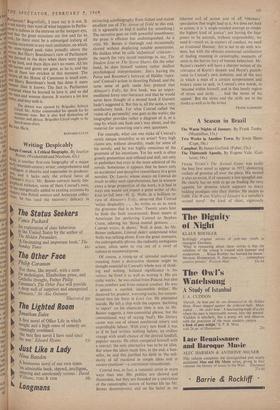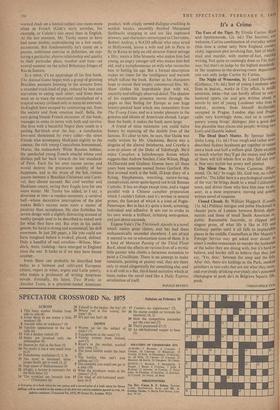A Season in Brazil Two Weeks in Another Town. By
Irwin Shaw. (Cape, 18s.) Camphor. By James Garford. (Faber, 15s.) FRANK TUOHY'S The Animal • Game was easily the best first novel to appear in 1957, showering rockets of promise all over the place. His second is also an event, if of necessity a less spangled one. He clearly has no wish to go on feeding the easy appetite for promise which supports so many balding prodigies into their thirties. Hi means to fulfil. The Warm Nights of January is a novelist's second novel : the kind of short, rigorously
worked etude on a limited subject one meets more often in Fretich (Gide's early novellas, for example, or Colette's late ones) than in English. At the last moment, Mr. Tuohy seems to have had some doubts, embroidering on a few exotic accessories. But fundamentally he's intent on a precise, ambitious exercise in definition, on cap- turing a particular, elusive relationship and quality in their particular place, weather and time—an austral summer on the soiled Bohemian fringes of Rio de Janeiro.
In a sense, it's an appendage of his first book. The Animal Game began with a group of grinning Brazilian peasants listening to the screams from a stranded truck-load of pigs, reduced by heat and starvation to eating each other; and from there went on to trace the emotional cannibalism of a tropical society civilised only in material externals. Its-English hero escaped by contracting out, from the society and from emotion itself. Bella, the easy-going blonde French decorator of this book, manages to come to terms with both and survive. She lives with a beautiful Negro slum youth in a peeling flat-block over the bay : a ramshackle love-nest threatened by every caller—the street friends who accompany Hadriano nightly to the cinema; the rich young Copacabana homosexual, Mario; the melancholy White Russian lesbian; the spectacled young French attaché whose cool dislikes pull her back towards the lost standards of Paris. Each for his own reason envies and would destroy the precarious stability of her happiness, and in the strain of the hot, riotous season between a Brazilian Christmas and Carni- val, they almost succeed. But cool weather and Hadriano return, saving their fragile love for one more winter. Mr. Tuohy has added, as I say, a diversion or two—a voodoo ceremony, a carnival ball—whose decorative interruption of the plot makes Bella's success seem more a matter of passivity than acceptance. He also furbishes his severe design with a slightly distracting amount of nudity (people tend to be described as naked save for what they have on). But even in his indul- gences, his hand is strong and economical, his skill enormous. In just 200 pages, a life you could not have imagined before is evoked, placed, defined. Only a handful of real novelists—Wilson, Mur- doch, Amis, Golding—have emerged in England since the war. It looks as if we may have found another.
Irwin Shaw can probably be described best today as a humane and cultivated European citizen, expert in wines, argots and Latin poetry, who makes a profession of writing American novels. Formally, his latest, Two Weeks in Another Town, is a precision-tooled American product, with crisply turned dialogue crackling in modish locales, smoothly finished Marquand flashbacks snapping in and out like cupboard drawers, and characters stereotyped as Chevrolets. Robert Andrus, a NATO official who once acted in Hollywood, leaves a wife and job in Paris to fly to Rome to help an old director-friend salvage a film; meets a lithe brunette who makes him feel young, an angry younger self who makes him feel old, and a nymphomaniac ex-wife who reconciles him to feeling his age. But a formal description makes no room for the intelligence and warmth which suffuse the book. Rather as his characters hope to rescue their empty, commercial film, Mr.
Shaw clothes his improbable plot with wit, sincerity and tellingly observed detail. The shadow of his expatriate presence moves through the pages as that feeling for Europe as one huge history-pocked land which one remembers from The Young Lions, and as a tender pleasure in the gestures and idioms of Americans abroad. Larger than the book, it makes the book seem large.
A friend of mine maintains you could halve history by exposing all the double lives of the famous. It's clear to him, he says, that Ouida was really written by Mr. Gladstone, Barrie was a disguise of the altered Swinburne, and Crawfie a nom-de-plume of the Duke of Edinburgh. He'd enjoy Camphor, a kaleidoscopic fiction which suggests that Andrew Sinclair, Colin Wilson, Hugh McDiarmid and Graham Greene have all these years been someone named .James Garford. His first avowed work is the bold, ill-kept diary of a flyting, blasphemous, wenching, nature-loving, metaphysical, never-quite-lapsed red-brick Roman Catholic. It has no shape except time, and a vague parallel with a Chinese camphor preparation which I couldn't follow, and it's written in several proses, the fanciest of which is a kind of Pugin- Pateresque. But in fact it's quite a book,' arresting, individual and adhesive. It sets out to evoke in his own words a brilliant, irritating semi-genius, and just about succeeds.
Eugene Vale's The Thirteenth Apostle is a novel which makes great claims, and has had them enthusiastically seconded elsewhere. I am afraid it seemed to me to substantiate none of them. It is a kind of Mexican Passing of the Third Floor Back, about the effects on various lives of a mystic little painter who climbs a ferocious mountain to paint a Crucifixion. There is no attempt to make mountain, painting or painter real, they are there only to stand allegorically for something else, and it is all told in a flat, third-hand narrative which at times makes the novel read like a Daily Express serialisation of itself.
RONALD BRYDEN











































 Previous page
Previous page